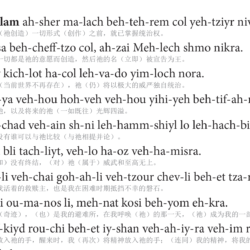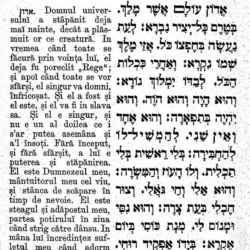| Source (Hebrew) | Translation (German) | Translation of German (English) |
|---|---|---|
אֲדוֹן עוֹלָם אֲשֶׁר מָלַךְ בְּטֶֽרֶם כׇּל־יְצִיר נִבְרָא׃ |
Der Herr des Weltalls — Er hat regiert, ehe noch ein Wesen geschaffen war. |
O God of all, You reigned supreme Before creation’s form was framed. |
לְעֵת נַֽעֲשָׂה כְּחֶפְצוֹ כֹּל אֲזַי מֶֽלֶךְ שְׁמוֹ נִקְרָא׃ |
Seit Alles vollbracht ist nach seinem Willen, ist Er der mächtige Herrscher, |
When all was finished by Your will, Your name Almighty was proclaimed. |
וְאַֽחֲרֵי כִּכְלּוֹת הַכֹּל לְבַדּוֹ יִמְלֹךְ נוֹרָא׃ |
und wenn dereinst das All vernichtet ist, wird Er allein regieren, der Allmächtige. |
When this, our world, will be no more, In majesty You still will reign. |
וְהוּא הָיָה וְהוּא הֹוֶה וְהוּא יִֽהְיֶה בְּתִפְאֲרָה׃ |
Er is, Er war, Er wird fein in Majestät. |
Who was, who is, will always be— In endless glory You remain. |
וְהוּא אֶחָד וְאֵין שֵׁנִי לְהַמְשִׁיל לוֹ לְהַחְבִּירָה׃ |
Er ist einzig, und kein Zweiter ist Ihm gleich, is Ihm ähnlich, |
Alone are You, beyond compare, Without division or ally. |
בְּלִי רֵאשִׁית בְּלִי תַּכְלִית וְלוֹ הָעֹז וְהַמִּשְׂרָה׃ |
ohne Anfang, ohne Ende. Sein ist die Macht und die Herrlichkeit, |
Without beginning time or end, Omnipotent You rule on high. |
וְהוּא אֵלִי וְחַי גּֽוֹאֲלִי וְצוּר חֶבְלִי בְּיוֹם צָרָה׃ |
Er ist mein Gott und lebendiger Erlöser, der Fels meiner Zuflucht in Zeit der Noth, |
You are my God, my Savior true, To Whom I turn in sorrow’s hour, |
וְהוּא נִסִּי וּמָנוֹס לִי מְנָת כּוֹסִי בְּיוֹם אֶקְרָא׃ |
Er ist mein Panier, Er ist mein schutz, Er ist mein Heil, wenn ich Ihn anrufe. |
My banner proud, my refuge sure— You hear and answer with Your power. |
בְּיָדוֹ אַפְקִיד רוּחִי בְּעֵת אִישַׁן וְאָעִֽירָה׃ |
In seine Hand befehl’ ich meinen Geist, wenn ich schlafe, wenn ich wache. |
Then in Your hand myself I lay, And pray to sleep and wake with cheer. |
וְעִם רוּחִי גְּוִיָּתִי אֲדֹנָי לִי וְלֹא אִירָא׃ |
Und wie den Geist, so auch den Leib, Gott is mit mir, ich fürchte Nichts. |
My soul and body are Your care. You are my God; I have no fear. |
“Adon Olam” is a piyyut that became popular in the 15th century and is often attributed to Solomon ibn Gabirol (1021–1058) and less often to Sherira Gaon (900-1001), or his son, Hai ben Sherira Gaon (939-1038). The variation of the piyyut appearing here is the 10 line (5 stanza) version familiar to Ashkenazi congregations. (Sefaradi siddurim have 12 line (six stanza) variants, and there are some with 14 or 15 lines.)
The German translation of “Adon Olam” appearing here is as found in Rabbi David Einhorn’s עלת תמיד Gebetbuch für Israelitische Reform-Gemeinden (1858), pp. 1-2. The English translation here, by Joshua Giorgio-Rubin, translating Rabbi David Einhorn, is as found in Rubin’s Olat Hadashah: A Modern Adaptation of David Einhorn’s Olat Tamid for Shabbat Evening (2020), p. 14.
Source(s)



“אֲדוֹן עוֹלָם (אשכנז) | Adōn Olam, translated from Rabbi David Einhorn’s Olat Tamid (1858)” is shared through the Open Siddur Project with a Creative Commons Public Domain Dedication 1.0 Universal license.






Leave a Reply